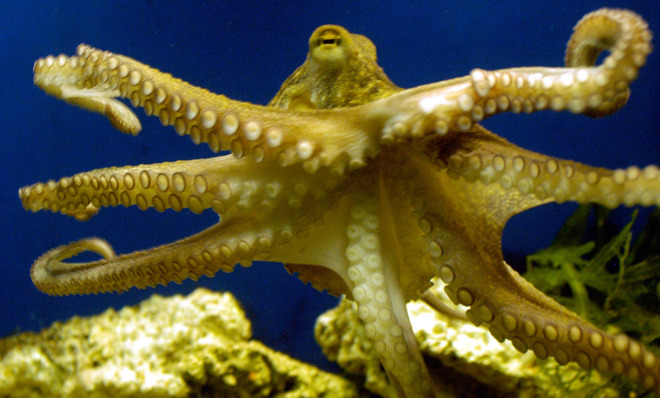Why don't octopuses get stuck to themselves?
Their arms have mighty suckers, but octopuses somehow manage to avoid wrapping themselves up in knots

A free daily email with the biggest news stories of the day – and the best features from TheWeek.com
You are now subscribed
Your newsletter sign-up was successful
Life can't be easy for octopuses. Sure, they're universally loved for changing color, opening jars from the inside, and predicting the winners of World Cup games. But they have eight very flexible arms to keep track of, which aren't even under their full control. Each arm is fairly autonomous, and a lot of the motor control happens in the neural circuitry of the arms themselves instead of the brain.
Forget about the left hand not knowing what the right hand is doing. At any given moment, not a single octopus tentacle knows what the other seven are up to — and neither does the octopus.
Not only are these eight arms writhing around unhindered by elbows, wrists, or a central control system, but each one is also covered in hundreds of suckers that will reflexively stick to just about anything. You would think that this would lead to octopuses getting tangled up in themselves pretty regularly, but it doesn't.
The Week
Escape your echo chamber. Get the facts behind the news, plus analysis from multiple perspectives.

Sign up for The Week's Free Newsletters
From our morning news briefing to a weekly Good News Newsletter, get the best of The Week delivered directly to your inbox.
From our morning news briefing to a weekly Good News Newsletter, get the best of The Week delivered directly to your inbox.
A new paper published today shows why: The one thing that the suckers don't stick to is the octopus' own skin.
For about an hour after amputation, an octopus arm pretty much acts as if it were still attached. It moves similarly, while the suckers grasp and stick to things they touch. In what must have looked like a darkly surreal experiment to anyone who stumbled upon it, a team of Israeli and American scientists observed what these flailing arms would and wouldn't grab.
In more than 30 trials, the researchers found that the suckers wouldn't attach to another octopus arm, whether it came from the same animal or a different one. Nor would they latch on to a petri dish that was covered in octopus skin.
They would grab another arm if it had been skinned, though. And if a petri dish was only partially covered, the suckers held the exposed plastic but avoided the skin.
A free daily email with the biggest news stories of the day – and the best features from TheWeek.com
It was starting to look like the skin made all the difference, so the researchers coated petri dishes in a gel that was soaked in dissolved chemicals extracted from the octopus skin. When they offered these to the amputated arms, the suckers grabbed them, but with 10 to 20 times less force than they did the regular, uncoated ones.
This confirmed that some chemical in the skin hinders the attachment reflex, thereby preventing the suckers from sticking. For the octopus, this means that each arm keeps the others from grabbing hold of it without the octopus having to worry about the details.
Interestingly, live octopuses have the ability to override the sucker-stopping signal when they want to. In another experiment, live animals showed they could grab amputated arms, but were less likely to do so if the arm had been one of their own. This suggests that they can tell their own limbs from another's. Furthermore, it's possible that their skin-recognition trick might involve the brain, and isn't limited to skin-sucker interactions.
Still, it's unclear which specific chemical prevents sucker attachment. Researchers think the mystery chemical probably acts on the chemical receptors in the individual suckers.
However it works, the self-avoidance system, the researchers say, is a "striking addition to the list of surprises" in the octopus' body. It not only keeps octopuses from tying themselves in knots, but also frees them up to do all the cool things we love them for.
-
 Political cartoons for February 16
Political cartoons for February 16Cartoons Monday’s political cartoons include President's Day, a valentine from the Epstein files, and more
-
 Regent Hong Kong: a tranquil haven with a prime waterfront spot
Regent Hong Kong: a tranquil haven with a prime waterfront spotThe Week Recommends The trendy hotel recently underwent an extensive two-year revamp
-
 The problem with diagnosing profound autism
The problem with diagnosing profound autismThe Explainer Experts are reconsidering the idea of autism as a spectrum, which could impact diagnoses and policy making for the condition